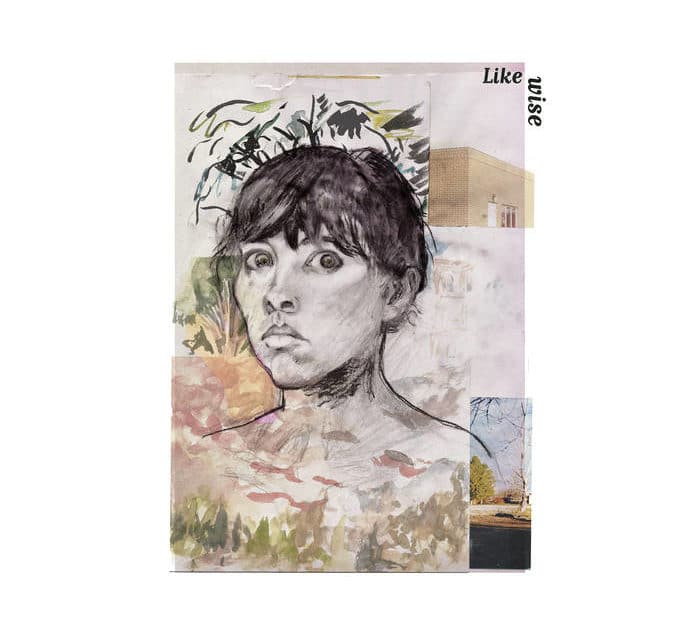
Frances Quinlan
Likewise
(Saddle Creek)
After growing her band Hop Along from a regional favorite in the Philadelphia area to the national and international stage of the course of four albums and fifteen years, Frances Quinlan just released here first “solo” album, Likewise. A few weeks before its release, I sat down with Frances at The Headroom Studios in Philly (where she recorded the album) to chat about the record and she performed acoustic versions of some of the songs for our latest SubModern Session, which you can listen to in the player below.
Likewise your first solo album, although I guess going back to the original Hop Along material… Hop Along, Queen Ansleis, those were essentially solo as well.
Frances:
This is the first album under my name. Probably the easiest way of looking at it.
So I guess going back to those original solo recordings. You’ve had so much happen. You’ve done so much between then and now. How is this a different animal than those were?
Frances:
It’s hard to really encapsulate all the differences. Hopefully there’s a lot of difference between myself now and myself when I was 19 and recording Freshman Year. I’m 34 come May. Woo hoo! So I mean the experience of collaboration. There was certainly a strong amount of collaboration on Freshman Year, even though it was an essentially solo project. I still had my friend Chris record four of those songs. My friend Damien DeRose of Peasant, who actually passed away a few years ago, he plays drums on a couple of songs on Freshman Year. The point being that was a collaborative effort. A bunch of friends sang on it. I had a friend play cello. I’ve never made anything completely by myself except for songs here and there. Certainly I did record a lot of that in my parents’ basement using Cubase on my laptop.
So on Likewise I know that Joe Reinhart [of Hop Along] produced it and contributed in that regard, but is it all yours otherwise? Do you play everything on the album?
No, again, it’s collaborative, but Joe plays. The instrumentation is very fluid. I think the main thing was we talked about it and I knew that I didn’t want to make some kind of acoustic or strictly even electric guitar record. The guitar for me is a vehicle, kind of always has been primarily just for writing. And that’s sort of why my skills with the guitar perhaps haven’t moved as quickly, because I use it as a tool for writing more so than as something to become particularly virtuosic.
I think you’re selling yourself short on that.
Frances:
Well thank you. I’ve been playing it since I was 16, so hopefully I’ve gotten better. I certainly hope so. But the main point being that the studio is for experimenting and being adventurous on instruments. I actually learned a few piano parts for this album. I play the piano on “Detroit Lake” and as well as “Your Reply.” I wrote that piano part. It’s a very simple part but it took me the winter. I stuck a keyboard in my living room, which is still there. I should probably move that. Just to force myself to play it and to learn my own written parts.
You hadn’t played piano or keyboard before?
Frances:
I mean, I played piano. Mark [Quinlan] and I, the drummer of Hop Along and my brother, we grew up playing piano. I think he played for three years and I played for two and we both unfortunately stopped.
So in writing the album and knowing that this is going to have your name on it, not Hop Along’s, did you approach writing the songs differently in terms of structure or subject matter or what have you?
Frances:
Certainly there were a couple songs because they were just written later and I knew they would be on this record, but otherwise I didn’t think about how I would make it really different from the band except that I wouldn’t be sticking to the guitar. I would be playing other instruments and just see what’s possible. Hop Along is four people, so that’s four arrangers, editors, brilliant musicians. So much changes from when I bring something to the band and then we work it out and record it. Just even things that stay closer to their original forms still have a different personality. They’re improved by everybody in the group. But I did want to make something that kind of did stay closer to its original form just to see what would happen and see just what would come from improvising and playing around and not worrying too much about anything being perfect. Especially because when we’re switching instruments off. I mean, I play percussion on a couple songs and I guarantee that it’s quite imperfect. It’s scrappy let’s say.
But then again, there’s even songs on Likewise that include Mark and Tyler [Long] because they are brilliant musicians and arrangers and they came up with those parts. I mean, I told them the vibe I wanted and having worked with them for so long, they do understand me so well. And that’s also why I think this was the perfect time for me to try to make a record under my name, but still working with extremely skilled people. I mean, Joe added so much to this record and had so many wonderful ideas, especially for “Rare Thing” and “Detroit Lake” and “Your Reply.” That was one of the ones that did stay, again, pretty close to the way I played it to begin with. But we added things to it and gave it some body.
And in terms of the lyrics, was there anything where you were like, “this is me speaking so I can talk about this,” whereas, you wouldn’t in the band.
Frances:
Perhaps unconsciously. I didn’t want to slow myself down. In my experience in writing, when I approach a subject and go, I’m going to write about this, it does more often than not, slow the process down because I’m creating barriers for myself. Once in a while there’s a song that it comes out so quickly and ends up being about a particular thing, like “One That Suits Me” [from Hop Along’s Bark Your Head Off Dog], which is pretty centered around the subject of the weapons being built in World War I – the mustard gas and things like that, and scientists blowing themselves up by accident. That kind of stayed true to one subject. Otherwise, I just let it be fluid.
Your voice is always fantastic and it’s so distinctive. I think with this album it’s obviously you, even for people who don’t know your name, they just know Hop Along, they’re going to know who it is. There’s no mistaking your voice.
Frances:
Well, thank you.
In a solo situation I think, I guess a lot of times artists use that as an opportunity to really showcase the voice moreso. Is that something that you wanted to do?
Frances:
I just wanted there to be space for any new possibilities, which is certainly the case with Hop Along as well. We talk a lot about restraint and about what songs need and the moods of songs. I think I just wanted to with this one, see what other moods could be possible with the voice and really think about… I mean, because there’re songs where I think the harp, Mary Lattimore plays harp on “Went To LA” on the recording and she’s magnificent and there are moments where it works out where she fills the space with her harp and then the guitar does more of it. The instrumentation is fluid. I think that was really the main thing. And who knows, I mean I like the idea of bringing that to Hop Along in the future. Maybe we’ll trade places more on stage, although that’s sort of a nightmare to me. I’m so comfortable on the guitar. I just know it the best. So it’s certainly been a challenge figuring out these songs for the live setting, because I do, I mean, I’m playing guitar on stage for these songs as well.
Find out where you can see Frances live on tour this March and see the video for “Rare Thing” at FrancesQuinlan.com. Likewise is available now on Saddle Creek Records.
By Josh T. Landow


